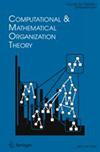组织、社会问题与制度变迁:充实组织研究的第三使命
IF 1.5
4区 管理学
Q3 COMPUTER SCIENCE, INTERDISCIPLINARY APPLICATIONS
Computational and Mathematical Organization Theory
Pub Date : 2021-10-01
DOI:10.1177/26317877211054858
引用次数: 18
摘要
各行各业的组织似乎正在把他们的目标从解决社会问题转向改变整个社会体系。这种现象提供了一个及时的机会来重新审视后来被称为组织理论的第三项任务。在本文中,我们探讨了组织学术如何在有组织的系统变革中有效地探索和理论化组织与社会系统之间的关系。有组织的系统变革是组织改变产生社会问题特征及其变化动态的条件的努力。作为理论化有组织系统变化的基础,我们开发了一个分析脚手架,帮助研究人员关注现象的基本方面,并在不忽略复杂性的情况下实现简约。在现实主义元理论和原则的基础上,脚手架减少了模糊性,为实证分析提供了支柱,并有利于基于机制的解释。我们建议,要产生关于有组织的系统变化的理论有趣和实际足够的知识,需要注意三个系统领域:第一,主观构建的系统问题领域,涉及评估和问题化情况的过程。第二,客观构成的情境领域,关注情境的事实特征及其变化的动态。第三,因果关系领域被理解为产生情境的客观特征和主观标准的机制,这些标准是评估情境作为问题的依据。最后,我们反思了边界和权力作为理论化有组织的系统变化的两个有前途的领域。本文章由计算机程序翻译,如有差异,请以英文原文为准。
Organizations, Social Problems, and System Change: Invigorating the Third Mandate of Organizational Research
Organizations across sectors appear to be shifting their ambitions from solving social problems to changing entire social systems. This phenomenon offers a timely opportunity to revisit what came to be known as the third mandate of organizational theory. In this paper we interrogate how organizational scholarship can productively explore and theorize the relationship between organizations and social systems in organized system change – an effort by organizations to alter the conditions that generate the characteristics of social problems and their dynamics of change. As a basis for theorizing organized system change, we develop an analytical scaffold that helps researchers to attend to fundamental aspects of the phenomenon and to achieve parsimony without blanking out complexity. Grounded in realist metatheory and principles, the scaffold reduces ambiguity, provides a backbone for empirical analysis, and favours mechanism-based explanation. We suggest that generating theoretically interesting and practically adequate knowledge on organized system change requires attention to three system realms: First, the subjectively constructed problem realm of systems concerned with processes of evaluating and problematizing situations. Second, the objectively constituted situational realm that attends to factual characteristics of situations and their dynamics of change. And third, the realm of causality understood as the mechanisms that generate both the objective characteristics of situations and the subjective criteria by which situations are evaluated as problems. In concluding, we reflect on the topics of boundaries and power as two promising areas for theorizing organized system change.
求助全文
通过发布文献求助,成功后即可免费获取论文全文。
去求助
来源期刊

Computational and Mathematical Organization Theory
COMPUTER SCIENCE, INTERDISCIPLINARY APPLICATIONS-MATHEMATICS, INTERDISCIPLINARY APPLICATIONS
CiteScore
3.80
自引率
16.70%
发文量
14
审稿时长
>12 weeks
期刊介绍:
Computational and Mathematical Organization Theory provides an international forum for interdisciplinary research that combines computation, organizations and society. The goal is to advance the state of science in formal reasoning, analysis, and system building drawing on and encouraging advances in areas at the confluence of social networks, artificial intelligence, complexity, machine learning, sociology, business, political science, economics, and operations research. The papers in this journal will lead to the development of newtheories that explain and predict the behaviour of complex adaptive systems, new computational models and technologies that are responsible to society, business, policy, and law, new methods for integrating data, computational models, analysis and visualization techniques.
Various types of papers and underlying research are welcome. Papers presenting, validating, or applying models and/or computational techniques, new algorithms, dynamic metrics for networks and complex systems and papers comparing, contrasting and docking computational models are strongly encouraged. Both applied and theoretical work is strongly encouraged. The editors encourage theoretical research on fundamental principles of social behaviour such as coordination, cooperation, evolution, and destabilization. The editors encourage applied research representing actual organizational or policy problems that can be addressed using computational tools. Work related to fundamental concepts, corporate, military or intelligence issues are welcome.
 求助内容:
求助内容: 应助结果提醒方式:
应助结果提醒方式:


